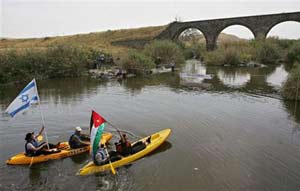|
 Members of the international Friends of the Earth group hold Israeli and Jordanian flags as they row kayaks in the Jordan River near Kibbutz Gesher. |
Mira Edelstein is an Israeli representative of Friends of the Earth-Middle East: "The state of the river at the moment is really dire. It is very polluted."
The Israeli government denies the finding. It says it conducted tests at the site and the water is perfectly safe for baptismal ceremonies.
But the site of Jesus' baptism is just the tip of the iceberg. Edelstein says the Jordan River is drying up because its waters have been diverted for domestic use and agriculture.
"We have recently conducted a study that we undertook in a regional fashion, with Israeli, Jordanian and Palestinian experts, and found that 98 percent of the river's waters have been diverted, only two percent of the river is left," she said.
The situation poses a dilemma for Israel which profits enormously from Christian tourism. About 100,000 pilgrims visit the site of Jesus' baptism each year.
Environmentalists say the only thing that can save the Jordan River is allowing more water to flow into it. But with a growing population, an arid Middle Eastern climate, and a chronic water shortage, that is easier said than done.
Great Pacific Ocean Garbage Patch: where world's trash collects
Oceans becoming more acidic, endangering sea life
Saving the 'world's most holy river'
(來源:VOA 編輯:陳丹妮)
